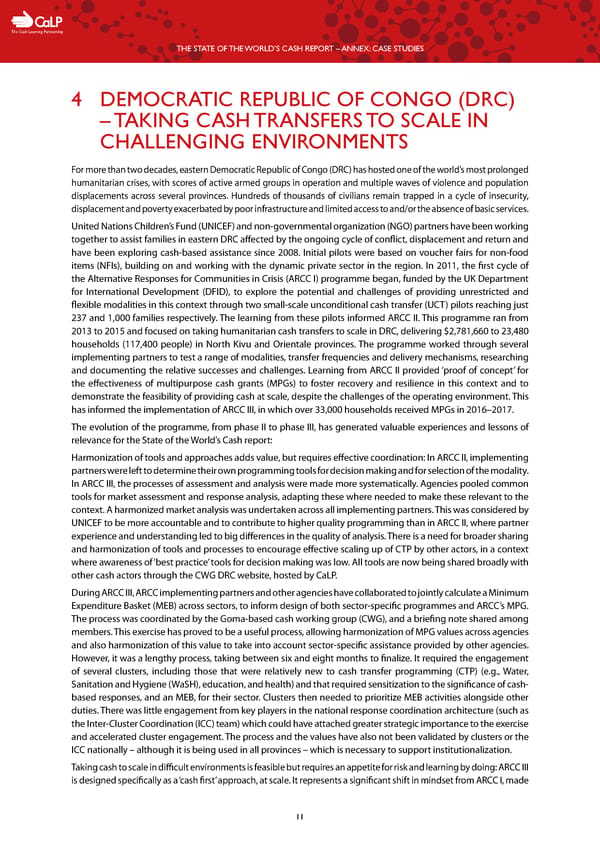C The Cash Learning Partnership THE STATE OF THE WORLD’S CASH REPORT – ANNEX: CASE STUDIES 4 DEMOCRATIC REPUBLIC OF CONGO (DRC) – TAKING CASH TRANSFERS TO SCALE IN CHALLENGING ENVIRONMENTS For more than two decades, eastern Democratic Republic of Congo (DRC) has hosted one of the world’s most prolonged humanitarian crises, with scores of active armed groups in operation and multiple waves of violence and population displacements across several provinces. Hundreds of thousands of civilians remain trapped in a cycle of insecurity, displacement and poverty exacerbated by poor infrastructure and limited access to and/or the absence of basic services. United Nations Children’s Fund (UNICEF) and non-governmental organization (NGO) partners have been working together to assist families in eastern DRC affected by the ongoing cycle of conflict, displacement and return and have been exploring cash-based assistance since 2008. Initial pilots were based on voucher fairs for non-food items (NFIs), building on and working with the dynamic private sector in the region. In 2011, the first cycle of the Alternative Responses for Communities in Crisis (ARCC I) programme began, funded by the UK Department for International Development (DFID), to explore the potential and challenges of providing unrestricted and flexible modalities in this context through two small-scale unconditional cash transfer (UCT) pilots reaching just 237 and 1,000 families respectively. The learning from these pilots informed ARCC II. This programme ran from 2013 to 2015 and focused on taking humanitarian cash transfers to scale in DRC, delivering $2,781,660 to 23,480 households (117,400 people) in North Kivu and Orientale provinces. The programme worked through several implementing partners to test a range of modalities, transfer frequencies and delivery mechanisms, researching and documenting the relative successes and challenges. Learning from ARCC II provided ‘proof of concept’ for the effectiveness of multipurpose cash grants (MPGs) to foster recovery and resilience in this context and to demonstrate the feasibility of providing cash at scale, despite the challenges of the operating environment. This has informed the implementation of ARCC III, in which over 33,000 households received MPGs in 2016–2017. The evolution of the programme, from phase II to phase III, has generated valuable experiences and lessons of relevance for the State of the World’s Cash report: Harmonization of tools and approaches adds value, but requires effective coordination: In ARCC II, implementing partners were left to determine their own programming tools for decision making and for selection of the modality. In ARCC III, the processes of assessment and analysis were made more systematically. Agencies pooled common tools for market assessment and response analysis, adapting these where needed to make these relevant to the context. A harmonized market analysis was undertaken across all implementing partners. This was considered by UNICEF to be more accountable and to contribute to higher quality programming than in ARCC II, where partner experience and understanding led to big differences in the quality of analysis. There is a need for broader sharing and harmonization of tools and processes to encourage effective scaling up of CTP by other actors, in a context where awareness of ‘best practice’ tools for decision making was low. All tools are now being shared broadly with other cash actors through the CWG DRC website, hosted by CaLP. During ARCC III, ARCC implementing partners and other agencies have collaborated to jointly calculate a Minimum Expenditure Basket (MEB) across sectors, to inform design of both sector-specific programmes and ARCC’s MPG. The process was coordinated by the Goma-based cash working group (CWG), and a briefing note shared among members. This exercise has proved to be a useful process, allowing harmonization of MPG values across agencies and also harmonization of this value to take into account sector-specific assistance provided by other agencies. However, it was a lengthy process, taking between six and eight months to finalize. It required the engagement of several clusters, including those that were relatively new to cash transfer programming (CTP) (e.g., Water, Sanitation and Hygiene (WaSH), education, and health) and that required sensitization to the significance of cash- based responses, and an MEB, for their sector. Clusters then needed to prioritize MEB activities alongside other duties. There was little engagement from key players in the national response coordination architecture (such as the Inter-Cluster Coordination (ICC) team) which could have attached greater strategic importance to the exercise and accelerated cluster engagement. The process and the values have also not been validated by clusters or the ICC nationally – although it is being used in all provinces – which is necessary to support institutionalization. Taking cash to scale in difficult environments is feasible but requires an appetite for risk and learning by doing: ARCC III is designed specifically as a ‘cash first’ approach, at scale. It represents a significant shift in mindset from ARCC I, made 11
 The State of the World's Cash | Case Studies Page 12 Page 14
The State of the World's Cash | Case Studies Page 12 Page 14